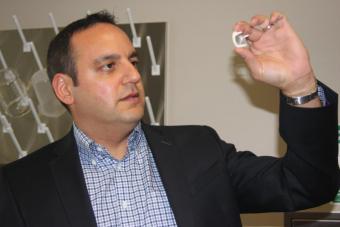 Dr. Arash Kheradvar, an associate professor of biomedical engineering, has received two prestigious grants to advance research and development in cardiovascular science.
Dr. Arash Kheradvar, an associate professor of biomedical engineering, has received two prestigious grants to advance research and development in cardiovascular science.
The Children’s Heart Foundation has awarded Kheradvar $200,000 over two years to support a hybrid tissue-engineered heart valve. Kheradvar and his research team are developing a patient-specific heart valve prosthesis with self-regenerating capacity. “This approach to engineering heart valves holds promise for combining the mechanical valves’ long-term durability advantages with biological valves’ self-regenerating capacity and improved biocompatibility and hemodynamics,” explains Kheradvar, a Fellow of the American Heart Association.
Kheradvar has also received a Grant-in-Aid from the American Heart Association to study patients with right-sided heart failure, using UC Irvine’s state-of-the-art 4-D-flow echocardiography technology. Despite the fact that right-sided heart failure may carry a worse prognosis than left-sided heart failure, almost no quantitative information is available on flow patterns inside the right ventricle. The main reasons for this lack of knowledge are the highly 3-D flow within the right side of the heart, and the inability of current imaging modalities to quantitatively map such 3-D blood flow patterns.
“This study should help us better understand the blood flow features in failing right hearts and devise more efficient therapies for these patients,” says Kheradvar.
The Kheradvar Research Group focuses on cardiovascular engineering with an emphasis on new cardiac imaging technologies, cardiac mechanics and novel heart valve technologies. Kheradvar is the author of more than 20 scientific journal articles and the lead inventor of 40 issued and pending patents. He received his medical degree from Tehran University of Medical Sciences and a Ph.D. in bioengineering from the California Institute of Technology. He is currently a member of the Samueli School’s Edwards Lifesciences Center for Advanced Cardiovascular Technology.
